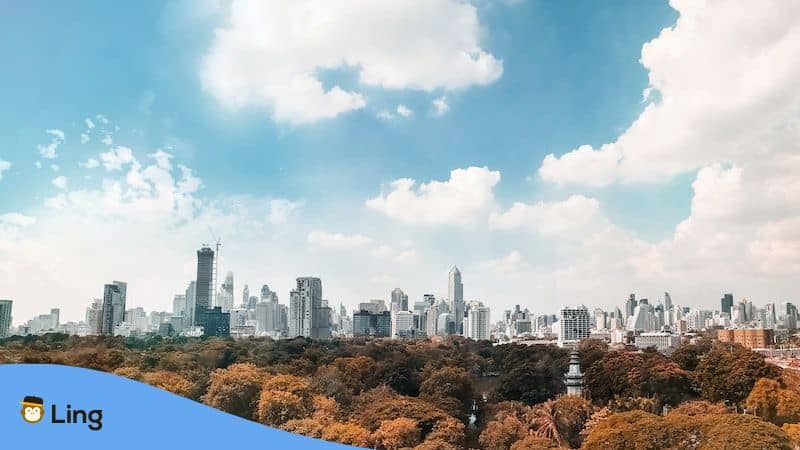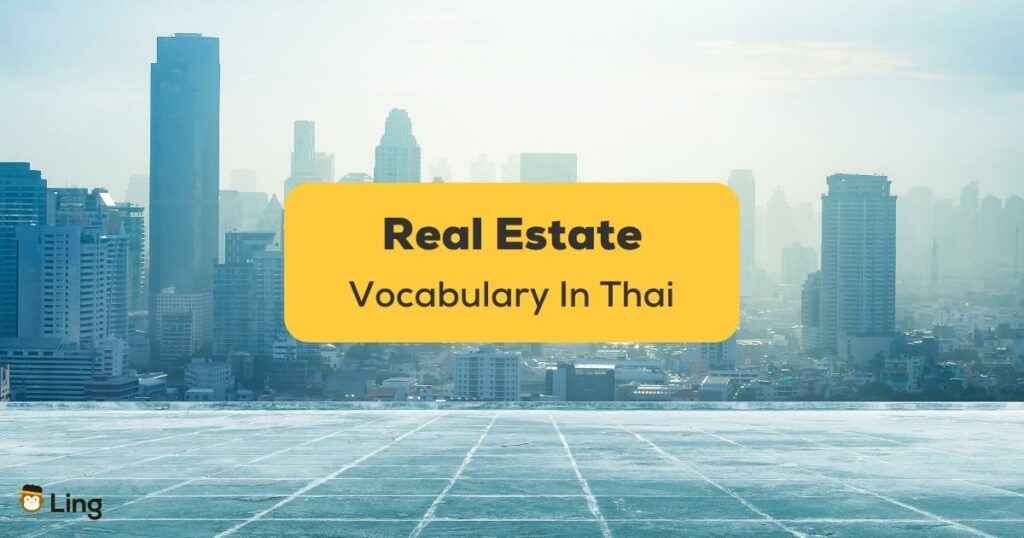A story I repeatedly hear while meeting ex-pats in Thailand is that they’d love to purchase a property in the land of smiles but, in some way, don’t feel confident enough to make the step. It’s true that the Thai property market is complicated, but perhaps if prospective buyers master real estate vocabulary in Thai, it might make them feel more comfortable because they can begin the process on the same terms as the seller.
If you’re thinking about learning Thai, whether as a brand new student or someone with more experience, you can’t go wrong with Ling. Ling is the gold standard of language learning apps, particularly for Thai (our head office is in Chiang Mai, and we have an entire staff of dedicated Thai programmers and language experts).
Real Estate Vocabulary In Thai- Some Basic words
Here are some basic words to get you off on a good start and your real estate in Thailand journey.

Real Estate Vocabulary In Thai – Useful Phrases
Learning basic vocabulary can only get you so far. If you really want to level up, it’s time to learn phrases.
How To Own A Real Estate Property In Thailand As A Foreigner
The three most common ways for foreigners to own a property in Thailand are Freehold, Leasehold, and Through a Thai company.
Freehold is when you own a condominium in a specifically designated building that allows for foreign ownership. However, there is a slight wrinkle with this. There is a maximum of 49% of foreign-owned properties allowed in one building, so if a building has already reached this limit, there is no opportunity to own a property there.
Leasehold means that, for all intents and purposes, you own the unit (for 30 years with the option to extend to 90 years); however, officially, you could be subject to the whim of the official owner.
Ownership by a Thai company is similar to leasehold but usually for villas and houses.

How Do You Transfer Foreign Funds To Thailand?
This process is surprisingly straightforward as long as you have the proper documents. This is where it’s important to have your i’s dotted and t’s crossed. You’ll receive a foreign exchange transfer form if you do this correctly. This allows you to transfer money into a Thai bank account and then back out of the country if you sell the property in the future.
Should You Work With A Local Estate Agent?
I would say yes. We’ve left out a lot of complexity of the process, including legal due diligence and the settlement and transfer process regarding the purchase price. If you can find a reputable agent, then it will save you a big headache. The fees are incurred by the property seller, not the buyer, and amount to about 5% of the property’s value. It is in the best interests of both parties to agree to this.
Other Things To Note:
Maintenance Fees – Buyers have to pay maintenance fees for the general upkeep of the common property areas, such as swimming pools and gardens. Maintenance fees are about 50 baht per square meter and are paid either yearly or monthly. They usually don’t cover repairs inside your property.
Sinking fund – This is paid to the condo complex by new owners as an act of good faith and is also judged by the square meter of your property(around 600thai baht per square meter). Although it’s different from the maintenance fees, it is used to pay for similar things.
Air B&B – Thai law means that you cannot put your property on Air B&B unless you have a hotel license. That being said, not many people follow this rule, and the government doesn’t usually prosecute.
Regarding long-term leasing to a tenant, it is probably best to hire a private rental company that will take care of your tenant.
Selling your property – This can be a little bit complicated. If you sell your property within five years of buying it, you must pay a special business tax of 3.3%. If you hold the property for over five years, you’ll pay a 0.5% stamp duty tax. If you sell through an agent, you’ll pay about 4% at the time of transfer. The land office also charges a 2% transfer fee which is shared between the buyer and the seller. Generally speaking, 7% is what tax you’ll pay when selling a property, not including agent costs (i.e., the broker’s commission).

Learn Thai With Ling
Well, that was mighty complicated, so just imagine how complicated it is if you don’t speak Thai and want to become an owner of your dream property. That is where Ling comes in, giving you all the basic and intermediate phrases needed to sufficiently handle a negotiation and become a property owner.
Ling allows you to practice speaking, reading, writing, listening, and grammar. Don’t worry; the lessons are nowhere near as complicated as the property purchasing process and take only about 10 minutes daily.
If you liked this blog, think about checking out a few others, such as Thai surnames and traveling in Thailand.
So do you feel ready to buy property in Thailand?




































































